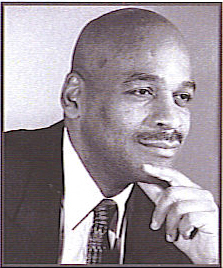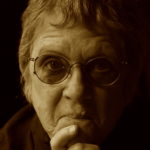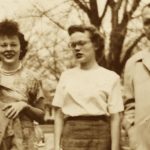Gary Lee is veteran staff writer who has reported from over 60 countries for the Washington Post travel section. Among his many awards, he won the 2002 Lowell Thomas Award in travel journalism for coverage of 9/11. A fluent speaker of five languages, Lee has covered Germany and central Europe for Time, written extensively about the environment, and served as chief of the Post‘s Moscow bureau (where he was nominated for a Pulitzer Prize for articles about Gorbachev’s Russia). A native of Tulsa, Oklahoma, he graduated cum laude with a degree in Russian language from Amherst College in 1979.
How did you get started traveling?
I was raised in Oklahoma but during my teenage years I went to boarding school in Andover, Massachusetts. During a trip back to school from vacation I decided to cash in my plane ticket and “ride the dog” — take a Greyhound bus — from Tulsa to Boston. I had a guitar, a jar of peanut butter and boundless curiousity about the open road. During a rest stop in Terre Haute, Indiana I decided to explore the city. I watched the driver pull away, then walked around for a half a day, fantasizing about taking a room and hanging out. I ended up taking the next bus out to Boston. Most anyone who has been in Terre Haute will understand why. But by then, my wanderlust had already awakened. After that, on every vacation I took the bus between New England and the Southwest. Thirty years after finishing school, I still sometimes hop on a bus to go to New York or Boston.
How did you get started writing?
When I was in sixth grade, I wrote a short story for my English teacher to read to her mother, who was in the hospital with cancer. It was about a gang who tries to take control of a junior high school. The next day, Mrs. Jones arrived in class and told me her mom liked what I wrote and was breathlessly awaiting the next episode. That night I went home and wrote another chapter.
That went on for two weeks. During that time I realized that writing was my calling. At Amherst College, where I was an undergraduate, I wrote for and edited the campus newspaper. Afterwards I got a job as a staff writer for Time Magazine. Six years later, I was hired at the Washington Post. I have been on the staff at the Post ever since. During the 1980s, when I worked in Germany and then Russia as a foreign correspondent, I started writing travel articles on the side. For the past nine years I have been a full-time feature writer with the Post‘s travel section.
What do you consider your first break as a writer?
In 1985 — the year Mikhail Gorbachev took power in the Soviet Union — I was assigned to be chief of the Washington Post‘s Moscow bureau. I had majored in Russian in college so there was no language barrier. But from a writing standpoint, the assignment was brutal and exhilarating at once. It forced me to bang out long pieces on deadline almost daily and to think about translating the mores of another culture into something Americans could understand. Most of all, feeding the untiring public hunger for information about Gorbachev’s Russia taught me to look at everything as a potential story. The guy selling potatoes at the market. What happens when you walk in a town in Siberia 45 degrees below zero weather. Everything. I included most of those stories in foreign news columns. I shaped others into travel section articles.
As a traveler and fact/story gathererer, what is your biggest challenge on the road?
When I arrive at a destination, I like to have a plan for what I want to focus on: music in Salvador Bahia, Brazil, art galleries in Dallas and Fort Worth, dive bars in LA, and so on. But I always grapple with how much I should stick with the plan and how much to riff, be serendipitous and follow the natural path that unwinds through every place. This is surely more of a problem for those writing for newspaper travel sections, where the space is pretty limited, the length of time one has to stay in a place is limited, and the articles are often theme driven. Usually, I can sense whether the events or conversations I am witnessing or taking part in fit into a narrative. If so, I go with it. If not, I go back to my script. Travel writing is like going on one blind date after another. Note taking also poses a challenge. So much happens so quickly that it’s not always easy to whip out a notebook and scribble. I am sometimes reluctant to start taking notes when I engage someone in conversation. I have learned to compensate by keeping a thorough journal. I write in it every night while I’m on the road, recording all the things that occurred over the course of a day.
What is your biggest challenge in the research and writing process?
Everything I write — even if it’s a couple of paragraphs long — seems to require thought. I devote much of that cerebral process to working on ways to avoid formulaic styles and cliches. I try to make the writing, fresh, crisp, stimulating. But the most constant grapple is in trying to shape trips that are are rambling and disjointed into a coherent narrative, a story that has a beginning a middle and an end. To help me do this, I always read my notes several times over and peruse pictures looking for themes or leitmotifs begin to emerge. Once that happens, I just start to write, to let it all out in one marathon sitting. The result is usually something that is far too long to be published in a newspaper or magazine. Then I start to whittle it down, refine anecdotes, check quotes, and so on.
What is your biggest challenge from a business standpoint? Editors? Finances? Promotion?
Being employed as a full time travel writer for a newspaper is a blessing and a curse. It has allowed me to explore and write about 66 foreign countries and 45 U.S. states, all on the payroll of the Washington Post. Not having to shop a story around is a rare blessing for a travel writer. At the same time, it leaves me little time for spreading my wings wide enough to write more extensive articles or books. At this stage, after more than two decades on the staff of a major daily newspaper, the grass on the independent writers’ side of the road is looking green.
Have you ever done other work to make ends meet?
I have never had to work as a bartender, waiter or in other such jobs. But in a sense, I became a reporter for weekly and daily publications to make ends meet. I would rather have gone into writing for myself, but feared that eking out a living as a freelancer would be too tough. Then, something interesting happened: the news assignments I got became so absorbing that I put the travel writing on a back burner. Near the beginning of my journalism career, for example, I wrote about environmental issues for Time Magazine. This was during the Reagan administration, when the interior secretary was selling off public lands in the West and the EPA administrator was trying to weaken statutes introduced to clean up rivers and lakes. Later, as a foreign correspondent for Time, I wrote about Germany at the beginning of a public discussion about reuniting the two Germanys. These subjects held my attention so strongly I had little energy or time for travel writing.
What travel authors or books might you recommend and/or have influenced you?
I like the works of Bill Bryson (for the humor) and Pico Iyer (for the intricate details). But I am most drawn to biographies, fictional works, histories, and books about places that are not strictly categorized as travelogues or travel literature. A few examples of books that I think elegantly capture particular places: John Steinbeck’s The Grapes of Wrath, about Oklahoma and California; Leo Tolstoy’s Anna Karenina
on St. Petersburg, Russia; James Baldwin’s Giovanni’s Room
on Paris; John McPhee’s Coming into the Country
, on Alaska; Karen Blixen’s Out of Africa
on Kenya.
What advice and/or warnings would you give someone who is considering going into travel writing?
Learn a foreign language or two. The study of an idiom other than your mother tongue will help you gain insight into how another culture ticks. Eventually the language will also offer an entrance into another country, a different world. Even if you harbor no ambition to write about foreign destinations, the perspective of exploring a different world and thought process will enhance your writing.
What is the biggest reward of life as a travel writer?
Every place I have visited has made me, in a some sense, a changed man. That goes for an overnight camping out on the Potomac River, or six days on the Trans-Siberian Express from Moscow to Ulan Bator, Mongolia. Writing about places has required me to take stock of what a destination is about and, in some way, to measure what I am about. It’s an exciting way to continuously educate myself and to grow.





